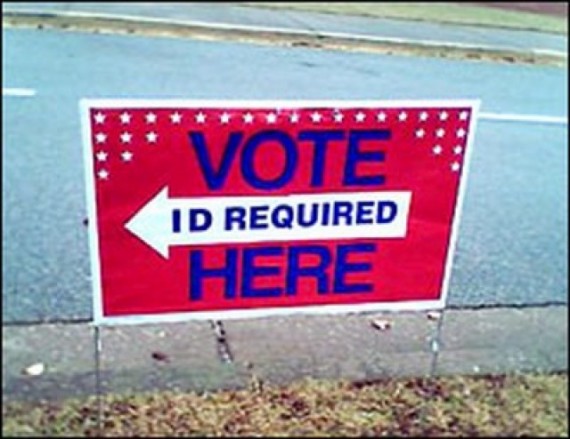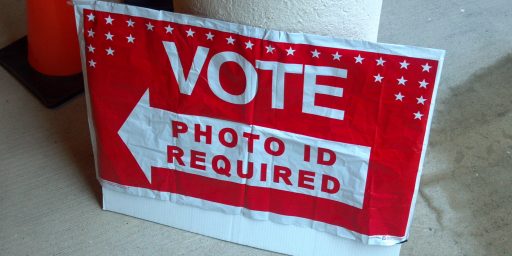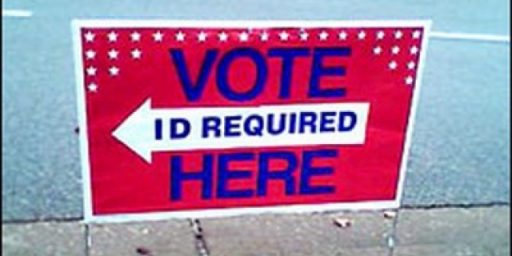Federal Court Finds That Texas Voter ID Law Is Intentionally Discriminatory
A big win for opponents of Voter ID laws.
In the latest development in litigation that has lasted nearly four years now, a Federal District Court Judge in Corpus Christi has ruled that Texas’s Voter ID law was drafted with the intent that it discriminate against minorities and the poor, a finding that could have a significant impact on its ultimate fate on appeal:
HOUSTON — A federal judge ruled on Monday that the voter identification law the Texas Legislature passed in 2011 was enacted with the intent to discriminate against black and Hispanic voters, raising the possibility that the state’s election procedures could be put back under federal oversight.
In a long-running case over the legality of one of the toughest voter ID laws in the country, the judge found that the law violated the federal Voting Rights Act.
The judge, Nelva Gonzales Ramos of the United States District Court for the Southern District of Texas, had made a similar ruling in 2014, but after Texas appealed her decision, a federal appellate court instructed her to review the issue once more.
The appeals court — the United States Court of Appeals for the Fifth Circuit, in New Orleans — found that Judge Ramos had relied too heavily on Texas’ history of discriminatory voting measures and other evidence it labeled “infirm” and asked her to reweigh the question of discriminatory intent.
In her ruling on Monday, Judge Ramos wrote that the evidence cited by the Fifth Circuit “did not tip the scales” in favor of the state.
Her ruling sets the stage for a potential penalty for Texas that could have a long-lasting impact. Lawyers involved in the case said the ruling effectively strikes down the law, although the judge did not issue a separate order doing so. Texas officials are likely to appeal the decision.
“We’re disappointed and will seek review of this ruling at the appropriate time,” said Marc Rylander, a spokesman for the Texas attorney general, Ken Paxton.
Some expected the ruling.
“This is an exciting ruling, but it is no surprise,” said Myrna Perez, a deputy director of the Brennan Center for Justice at New York University Law School, which represented two of the groups that sued the state, the Texas N.A.A.C.P. and the Mexican-American Legislative Caucus.
“Texas passed the most restrictive photo ID law in the country — a law the legislators knew would hurt minority voting rights, without any evidence justifying it, and they broke all sorts of legislative rules and norms to do it,” Ms. Perez said.
Judge Ramos acknowledged the difficulty of pinning down the Legislature’s motives. She wrote of considering “all available direct and circumstantial evidence of intent” rather than trying to “discern the motivations of particular legislators.” The judge highlighted attempts by Democrats to blunt the racial impact of the law, known as Senate Bill 14, through amendments that were ultimately rejected, including allowing additional types of photo identification. “Many categories of acceptable photo IDs permitted by other states were omitted from the Texas bill,” she wrote.
Kristen Clarke, the president and executive director of the Lawyers’ Committee for Civil Rights Under Law, which represented some of the plaintiffs, said the ruling on Monday marked the fifth time that a court found that the law had a discriminatory purpose or effect.
Judge Ramos’s decision, she said, “should sound the death knell for burdensome voter ID requirements in Texas and across the country.”
For decades, Texas and several other mostly Southern states with a history of discrimination had been required to seek federal approval before making changes to their voting laws. But the states were freed from that requirement in 2013, after a Supreme Court decision that invalidated key provisions of the Voting Rights Act.
The finding of intentional discrimination could once again put Texas under federal supervision. It would be the first state brought back into so-called preclearance since the Supreme Court’s 2013 ruling. Judge Ramos did not address whether she would order Texas to undergo federal oversight, but will examine the issue during the next stage of the case.
The law was passed by the Legislature and signed by then-Gov. Rick Perry in 2011, but took effect in 2013. It required voters to show a driver’s license, passport or other government-issued photo ID before casting a ballot. It was previously found by the appellate court to have a discriminatory effect on black and Hispanic voters, many of whom lacked government-issued photo identification, and as a result was softened for the November 2016 election.
Numerous Democratic lawmakers, voters, civil rights organizations and black and Hispanic groups sued, arguing that Republican legislators steamrollered the bill through the State House and Senate. They said legislators departed from procedural norms in passing the law, including classifying it as emergency legislation, cutting debate short and bypassing the ordinary committee process in both chambers.
The plaintiffs told Judge Ramos in court documents and at various hearings that the law’s true purpose was to help Republicans maintain their hold on power amid the fast-paced growth of Democratic-leaning black and Hispanic voters.
Republican officials, including Gov. Greg Abbott, who defended the law in court when he served as the state’s attorney general, have long disputed any suggestion that lawmakers intentionally discriminated.
Ian Millhiser summarizes the Court’s opinion:
Monday’s order in Veasey v. Abbott notes several factors that suggest the law was enacted for the purpose of discriminating against African Americans and Latinos, including the law’s disparate impact on these voters and the fact that state lawmakers rushed the state’s voter ID law “through the legislative process without the usual committee analysis, debate, and substantive consideration of amendments.”
The court also noted that, “Texas had become a majority-minority state” with “polarized voting patterns allowing the suppression of the overwhelmingly Democratic votes of African-Americans and Latinos to provide an Anglo partisan advantage.” The state’s Republican legislature, in other words, could use race as a proxy for partisan affiliation. By passing a law that would disproportionately target African Americans and Latinos, lawmakers could protect Republican rule.
Additionally, while Texas claimed that its law exists to prevent voter fraud, not to disenfranchise voters of color, “the evidence shows a tenuous relationship between those rationales and the actual terms of the bill.” Of the 20 million votes cast in the ten years before this law’s passage, only two people were convicted by the kind of voter fraud that is supposedly targeted by voter ID.
This ruling is the latest development in a series of legal challenges against the Texas law that began back in 2013 when the Federal Government filed its own lawsuit against Texas challenging the law under the Voting Rights Act and other provisions of the law, an action that was followed by numerous private actions against the law in the same Court. In October 2014, one of those lawsuits resulted in a ruling in which Judge Gonzalez struck down the law based in no small part on her finding that it had been drafted with a specific intent of discriminating against minorities and the poor and benefiting the Republican Party, a finding which came in the wake of a trial that lasted more than two weeks and included the consideration of evidence such as statements made during the public debates on the law in the Texas legislature. Given that this ruling was handed down mere weeks before the 2014 midterm elections, both the Fifth Circuit Court of Appeals and the Supreme Court issued rulings modifying the District Court Order and allowing the law to remain in effect for the impending General Election, but that was far from the end of the case. Nearly a year later, the Fifth Circuit Court of Appeals issued its own ruling striking down the Texas law that largely agreed with Judge Gonzalez’s ruling. In a subsequent ruling a year later, the Fifth Circuit ruled that the Texas law violated the Voting Rights Act of 1965.
As Millhiser notes, the ruling faces something of an uncertain future on appeal. For one thing, the Fifth Circuit remains dominated by Republican appointees even after eight years of Barack Obama in the White House, although it is noteworthy that that Court has been consistently critical of the law in its rulings in this case over the past two years. Additionally, it’s unclear at this point what impact the arrival of Justice Neil Gorsuch on the Supreme Court might have on how the Court will view this case and where it might ultimately come down on the issue. It has been nine years since the Court ruled on Voter ID laws in general, and in that case, it was dealing with one of the earliest incarnations of such laws coming out of Indiana. There have been a number of developments since that time, including numerous academic and on-the-ground studies that clearly establish that the kind of in-person voter fraud that these laws are intended to prevent occurs on an incredibly rare basis and that, regardless of the state in which they have been enacted, these laws have had a discriminatory impact on minorities and the poor. Additionally, unlike previous cases, this case comes with a factual finding from the trial judge that there was a discriminatory intent behind the law, a finding that hasn’t been part of the record in other cases. This is potentially significant because the law generally holds that, while a trial judge’s legal rulings are essentially subject to de novo review by an appellate court, factual findings generally cannot be overturned unless there is evidence in the record that shows them to be clearly erroneous. This means that both the Fifth Circuit and the Supreme Court may well be bound to apply the law based on this important factual finding, and that could mean the difference in whether or not Judge Gonzalez’s ruling stands or whether it is ultimately overturned. For the time, being, though, this is a clear victory for critics of Voter ID laws and a defeat for states such as Texas that have adopted laws such as this over the past several years.
Here’s the opinion
Veasey Et Al v Abbott Et Al Opinion by Doug Mataconis on Scribd






A Texas voting law discriminatory?! Say it ain’t so.
How the appellate and Supreme Courts don’t see these laws as the unconstitutional poll tax that they are, I don’t know.
If the state is going to argue that IDs for voting serve some useful public policy objective, then it should take the next logical step of ensuring that every citizen can get an ID cheaply and easily. But of course, we know why the state has no interest in doing that.
In other breaking news, water is still wet 🙂
@Pch101:
If they propose to condition access to voting on the production of identification, then I’d say that as a matter of law they have to then provide that identification to any and all otherwise eligible voters for free. The second they charge for it, even a penny, it becomes IMO a violation of the 24th Amendment.
I’m shocked, shocked that gambling is going on in here.
…Your winnings, sir.
Oh, thank you very much!
@HarvardLaw92: Indeed.
For as long as I have been a Texas resident (off and on since 2002), the County voting offices mail out annual Voter Registration Cards to each voter each year. It is a postcard sized piece of card stock that gives all of your pertinent voting information, including which precincts / places / districts you live in. It is an automated mailing that is standardized across the State, that carries no additional charge to the voter.
It is not, however, a photo ID.
Prior to this Voter ID law, you were supposed to bring this free card with you when you voted, and other IDs like a Texas driver’s license, state ID, or US passport would suffice if you didn’t have the card with you.
So a non poll tax mechanism existed before this law was enacted, and still exists. It was deemed sufficient for decades prior to this current law.
Now add in that most non-urban county Driver’s License offices are located in places that you can only effectively get to by car. And that there are rural counties where the only office is open from 1 pm – 5 pm on the 3rd Wednesday of the month. Etc.
So not only does it meet the poll tax requirement on its face, it replaced a working system that met pre-clearance requirements for decades with few material instances of voter identification fraud identified.during that time.
Yeah.
A complete charade. These people are insisting on ‘solving’ a problem – in person voter fraud – that does not exist.
Oh wait, that’s not the problem Republican states are trying to solve. The problem they’re addressing is: there are still Democrats who vote in their local, county and statewide, and federal elections.
@al-Alameda:
This is my favorite piece on that issue. Nobody writes like Sorkin …
@HarvardLaw92:
Excellent. Yeah, I miss that show.
You know, I’ve lived in 2 residences since 1985, and my current place since 1991. I always vote in person, and I’ve never once been asked to provide identification in order to vote.
Polling people ask my name, they go to their registers, ask me if, for example, ‘666 Vote Suppression Street’ is my address, I answer affirmatively, they hand me the ballot packet, that’s it. 32 years of skating by – should turn myself in for voting while White and a Democrat?
Last year my wife received an absentee ballot for her then recently deceased father. She could have filled it out, mailed it in and … who knows if they would have found out. Instead she called the county offices, informed them of the situation and sent them a death certificate and asked them to take her father off the roll.
@al-Alameda:
That’s what truly makes these laws so insidious. Election fraud as a whole is miniscule, statistically insignificant, but what little does occur is overwhelmingly related to absentee ballots. In person voter fraud is essentially non-existent – what little evidence we do have that it occurs at all tends to be when people are arrested for attempting it.
So we have a situation where the actual source of much of the tiny amount of election which actually does occur involves a method of voting which Republicans like – absentee voting – and one which is disproportionately employed by factions – white, elderly, etc. – which tend to vote Republican. Meanwhile, the essentially non-existent segment is represented by the method which is favored by people who DON’T vote Republican – minorities, the poor, etc.
I’m not sure that anyone was fooled with regard to the true purpose of these statutes – even the people who are vociferously defending them …
OT…but un-flipping-believable.
Sean Spicer today claimed that Hitler never used chemical weapons on his people, and so Assad is worse.
https://www.usatoday.com/story/news/politics/onpolitics/2017/04/11/spicer-hitler-didnt-even-sink-to-using-chemical-weapons/100333958/
@HarvardLaw92:
It should be obvious that being required to shell out cash for Items X or Y as a precondition for voting is the equivalent of a poll tax: It couldn’t be any clearer that the failure to pay –> no voting.
But the courts above the district court level have claimed otherwise. I find it remarkable that something that unambiguous could be missed, yet it is.
@HarvardLaw92: So does it follow that all id requirement rules are unconstitutional?
Employee, library, drivers license, discount club, swimming club, school, hunting, fishing, health insurance.
@Tyrell:
You can’t legitimately be that obtuse …
The ability of the left to memory-hole unpleasant facts is truly astounding. The ACORN scandal actually did happen. In 2008 alone, the Democrat-affiliated “community organizing” group submitted 400,000 bogus voter registrations. Congress cut their funding and they went out of business. People went to jail for this!
And, now you have the nerve to attack Republicans for trying to do something to protect the integrity of the system. Something that 75% of Americans want. Amazing!
@Pch101:
Which ones (asking seriously)? I’ll admit that this is not an area of litigation which I really keep up to speed on, but the only two cases I’m directly aware of in this regard are Crawford v. Marion County Election Board and Frank v. Walker.
Crawford, IMO, was rightly decided, primarily because Indiana actually did provide the required identification for free (although the matter of required supporting documents wasn’t addressed as clearly as I would have preferred). Frank is a mess currently in litigation in which voters who are unable to meet the identification requirement are allowed to vote by affidavit (for the time being anyway).
Bring me up to speed on the ones I’m missing, please?
@Gavrilo:
Not for nothing, but do you have evidence that a single one of those 400,000 registrations resulted in an illegal, in person vote? Supply it please.
You’ve just provided us with evidence that the system is capable of detecting – and indeed DID detect – fraudulent registrations before they resulted in fraudulent votes. So thanks for making our point for us, I guess.
You need to work on your debate skills, and for your own sake never try to represent yourself in a courtroom. You’ll end up getting prosecuting yourself …
@Gavrilo:
http://www.nytimes.com/2008/10/24/us/politics/24acorn.html
@HarvardLaw92:
In this case, the Fifth Circuit previously ruled that the law was discriminatory but rejected the argument that it was a poll tax.
The short version of the decision is that the cost is indirect and does not discriminate, so it isn’t a poll tax. (Yeah, I think that it’s a pile of bull, too.) Starting at page 74:
https://www.brennancenter.org/sites/default/files/legal-work/Texas_ID_Fifth_Circuit_072016.pdf
The district court, however, has concluded that it is a poll tax, so not all reason has been lost.
@Gavrilo:
I’m sorry. You don’t seem to have understood the question. Allow me to repeat it for you:
do you have evidence that a single one of those 400,000 registrations resulted in an illegal, in person vote? Supply it please.
So far, you’ve shown me that registration workers paid by quota will cheat (shocker …) and that the system actually catches those fraudulent registrations.
So, I’ll ask again – where are these fraudulent in-person VOTES?
@HarvardLaw92:
“In Reynoldsburg, Ohio, Claudel Gilbert was indicted on two felony counts of illegal voting and false registration, after being registered by ACORN to vote in two separate counties. He pled guilty to the illegal voting charges”
https://ballotpedia.org/ACORN_and_voter_registration_fraud
@Pch101:
True, although I believe that TX amended its statute to make the identification available for free (although we’re still left, IIRC, with the issue of underlying supporting documentation). We’re also talking about the 5th Circuit … 🙄
That having been said, I agree – the operative factor here is not the nature of the identification or whether the charges are primary / secondary, but instead is the INTENT of the statute itself in requiring that they be obtained. I don’t think that Section 10(a) of the VRA was in any way unclear.
@Gavrilo:
So the best that you can do is a Haitian immigrant who was confused about voting procedures & thought he had to vote in both places in order for his vote to count?
Seriously?
Tell you what – the ridiculously small magnitude of in-person election fraud notwithstanding, I don’t even have a substantial problem with the concept of voter ID. I’ll stipulate that we’re in agreement that the concept itself of simply showing an identification card in order to vote isn’t objectionable.
Just provide them for free to every eligible voter and we’re golden. Everybody wins …
You on board?
So gavrillo’s evidence for massive in-person voter fraud is that one guy tried to do it once and was arrested and prosecuted.
Logic–how the fuck does that work?
@HarvardLaw92:
What goes unsaid in all of these discussions, by numbskulls like Gavrillo, is that the election system is not fine grained enough to even capture the infinitesimally small amount of fraud…in other words, the margin of error inherent in the system is far greater than any amount of fraud that exists.
Like we all know…and Republicans only admit by mistake…this is a solution aimed at a problem that doesn’t exist in order to accomplish something else entirely.
@HarvardLaw92:
You asked for one example of a voter fraudulently registered by ACORN illegally voting and I gave you one. Now, you’re trying to move the goalposts. Why am I not surprised?
I’ve been pretty clear around here over the years about voter id. Regardless of the frequency of actual in person voter fraud, enhancing the integrity of the process is a compelling state interest, as Justice Stevens wrote in Crawford. Further, the vast majority of Americans favor voter id, another compelling interest. Finally, as I mentioned, the memory-holing of ACORN by the left is despicable. The push for voter id didn’t happen out of the blue. It was a reaction to the systemic voter registration fraud, perpetrated over many years, by a group aligned with the Democratic Party.
@Gavrilo: are you aware that people collecting voter registrations are required to turn them all in, whether they suspect fraud or no?
It’s a requirement that protects against throwing out the registration of anyone registering as Republican, or all women, or all black people.
And how many were duplicates? Those were the people who weren’t sure if they were registered, so registered again. This isn’t a problem.
The Acorn Scandal was just made up by the right, throwing together a bunch of things that sound scary if you don’t understand anything, and is part of why so few people outside the fever swamps believe you on anything
Texas has just sentenced a woman to eight years for illegal voting. (She apparently thought that she could vote because she feels like a super duper American.)
https://www.washingtonpost.com/news/post-nation/wp/2017/02/11/republican-green-card-holder-who-voted-illegally-in-texas-gets-8-years-in-prison
Of course, she voted for Trump. What a genius.
In any case, it would be absurd to claim that she changed the outcome of the election. There weren’t enough illegitimate voters to matter one way or the other.
If you want to skew election results, then the most effective way to do that is to prevent people from voting. And suppressing the vote is standard operating procedure for the GOP, which knows that it can’t win if turnout is high, particularly among the minority voters whom the Republicans go out of their way to alienate.
There is a difference between bogus voter registrations and actual voting. If some low-paid voter registration grunt worker who is paid by the signature and/or has a quota turned in some bogus paperwork in order to make extra money, but no one subsequently bothered to vote based upon those bogus registrations, then those have no impact of the election outcome at all. That should be illegal, of course, but the election results remain unchanged.
Perhaps one thing that we should ban are payments to voter registration workers that are based upon volume. Pay them by the hour, not by the piece.
@Gavrilo:
So that is a yes to free identification cards for all voters?
@Gavrilo:
No…the myth-making by Republicans about ACORN is despicable. Complete and utter nonsense. Like tax cuts that pay for themselves and Death Panels.
And of course…voter fraud.
@HarvardLaw92:
Absolutely. I’ve said that here numerous times. I always get the same hyperventilating response. “But, but some people don’t have their birth certificate and they’ll have to pay for a duplicate in order to get the free photo id!!”
@Gavrilo:
If you truly cared about the integrity of the elections, then you would want to make damn sure that everyone who is entitled to vote is able to vote.
But you obviously don’t care. You’re either a dupe or a concern troll (and no, neither of those is a compliment.)
@Gavrilo:
Free means free – the entire process. Hell, the state MVA / DMV should be able to call up birth certificate records on their computers to start with. You’ll wipe out “voter fraud” and streamline government IT in one fell swoop.
I would prefer that the Feds preempt state voter registration and issue every US citizen an identification card – like a CAC – with PKI. That way, you can vote from ANYwhere, with reasonable security, and everybody gets to vote.
@Gavrilo: “In Virginia, and other states, it’s a crime to accept a voter registration form and not turn it in.” This is to prevent voter registration fraud, where forms are dumped. This has occurred, I suggest you research it.
@Gavrilo:
Seems odd that the push for voter ID has continued even though ACORN closed in 2010.
by this measure isn’t requiring someone to register to vote also an “undue burden” on their right to vote?!
oh, some chick just got 8 yrs for voter fraud in Texas…….and if “the roach rule” is followed then it’s more common than thought!
but how else would democrats win anything if they couldn’t cheat?!
what with “blacks and minorities being too dumb to vote on their own” (as liberals say without actually saying it)
maybe the supreme court will see it differently-i mean really, how many civilized countries allow voting without an id?!
@bill:
Australia, Denmark, New Zealand the United Kingdom, Ireland, Netherlands, Norway, Switzerland, Sweden for starters.
Or are those not civilized enough for you?
@bill:
Countries such as Spain, Greece, France, Malta, Belgium, and Italy provide national identity documents to their citizens to use for many purposes, including travel, banking, and healthcare access as well as voting. In Spain, Greece, Malta, Belgium, and Italy, possession of such documents is compulsory.
@bill:
The “chick” in Texas voted for Trump. Don’t you ever get tired of winning? So much winning lol
It is nice to see people like bill and Gavrilo presenting arguments for a National ID card. There are so few topics around there that we can all agree on. A single government photo ID that follows you from address to address and state to state, that can be used to verify immigration / citizenship status against a single Federal database – what a great idea!
Once we get the national ID card we can require it for buying guns…it wouldn’t violate the 2nd amendment because everyone would have one, so no burden. And of course, if the government happened to fail to delete the records of the purchases….
thanks, racist dummies!
Somebody catch me up on this:
Trump said that if you subtract all the illegal voting he actually won the popular vote.
The clear inference being that there were at least 3 million illegal ballots for Hillary Clinton, Golly, that’s serious! If that can be proved, it certainly would lead us to a need for Voter ID, right?
So …
(1) How has the Justice Department investigation of this gone?
(2) When does Sessions anticipate reporting to the public on this?
(3) Do you think results will be reported before the 2018 mid-term elections?
@Tyrell: NO.
(Are you really that stupid?)
@Gavrilo:
Move the goalposts?
Please, the facts matter. You’re willing to require a national Voter ID system because of a verifiable handful of illegal in-person votes in the past 8 years?
The National ID Card is the fastest way to get to an actual, factual, gun registry, so I’ll bite. If racists trying to stop black people from voting inadvertently get us there, well, tough titty for them!
@Gromitt Gunn:
It’s nice when you can lead a horse to water and make then drink too, no? 🙂
J. Geils…RIP
@teve tory: No, a lot of people are not going to take a number being forced on them. Next will be an rfid chip implant.
Big Talk.